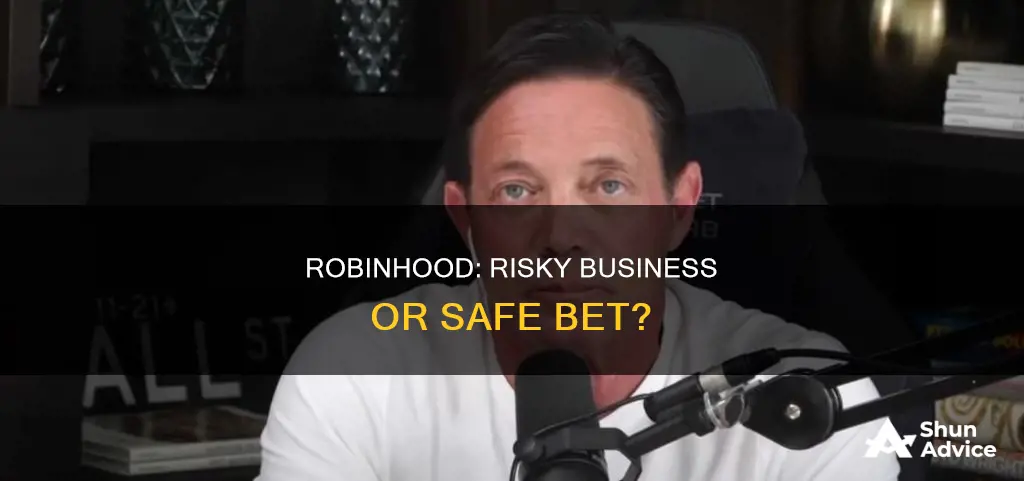
Robinhood is a popular financial services company that facilitates individuals to trade cryptocurrencies, exchange-traded funds (ETFs), individual stocks, and options. It offers commission-free trades and services similar to any other brokerage company. However, there are several reasons why people may not like Robinhood for investing. Firstly, Robinhood has faced criticism for its customer service, with users reporting long wait times for responses and a lack of a dedicated customer support line. Additionally, Robinhood has experienced service interruptions and outages during periods of high market volatility, leading to customer complaints and a $70 million settlement. Robinhood also has a limited range of investment offerings, not providing access to mutual funds, bonds, foreign stocks, and other asset types. The platform also lacks advanced research and educational tools, making it unsuitable for serious investors. Furthermore, Robinhood has been criticised for its payment for order flow (PFOF) practices, where it sells user data to high-frequency trading firms, prioritising its own profits over customers' interests. Lastly, Robinhood's app design and features may encourage active trading, which is not a suitable strategy for most investors.
| Characteristics | Values |
|---|---|
| Customer service | Notoriously bad, with long wait times and a lack of urgency |
| Leadership | Lacking, with the CEO needing to hire someone else to be the point man |
| Payment for order flow | Sells data to high-frequency trading firms |
| Delayed stock quotes | Real-time orders, but charts and data are often delayed |
| Cryptocurrency product | Limited selection, no coin withdrawals, no access to wallet or wallet address, no private keys |
| Account types | Only offers standard, individual investing accounts |
| Investment types | Only four types of assets available for investment |
| Watchlist features | Can't sort lists alphabetically or by price, volume, bid price, or other indicators |
| Outages | Multiple outages during volatile market periods |
| Security | Data breaches and hacks have occurred |
| Suitability | Not suitable for long-term investors or those investing for long-term goals |
What You'll Learn

Poor customer service
Robinhood has been criticised for its poor customer service. The company does not list a customer service phone number in the Contact Us section of its website, and customers have reported difficulties contacting the company by phone. While Robinhood does respond to comments on its social media accounts, it does not appear to offer responses to individual customers' queries.
Robinhood's customer service has been described as "horrible", "pathetic", and "the worst". One customer complained that they were unable to access their account and that "no one reads" the emails they send. Another said that they had been waiting nine days for a response to their query. A third said that they had been waiting three days for a response to their query, and that when they did receive a response, it was a "BS response" that did not relate to their question.
Some customers have reported that Robinhood has closed their accounts without authorisation and transferred money to an unauthorised account. One customer reported that $460k of their money was frozen by Robinhood and that they only managed to retrieve it by reporting the company. Another said that Robinhood had closed their account and "froze $4200 of my money".
Robinhood has also been criticised for its response to suspected fraud. One customer reported that their friend had used their cellphone to log into their Robinhood account, after which their account was restricted. The customer sent a copy of their driver's license and bank statement to Robinhood, but the restriction was not removed. Another customer reported that their account had been hacked and that Robinhood had failed to respond to their requests to restrict the account.
In addition to these issues, Robinhood has been criticised for its role in the GameStop short squeeze of 2021, during which it restricted trading. The company has also been fined for misleading customers and providing false or misleading information.
ETFs: Why Investors Are Flocking
You may want to see also

Lack of investment types
Robinhood is a financial services company that allows users to trade cryptocurrencies, exchange-traded funds (ETFs), individual stocks, and options. The platform is designed to be user-friendly, with a simple interface, zero-fee trades, no account minimums, and an easy-to-use mobile app. However, one of the main drawbacks of Robinhood is the lack of investment types available to users.
Robinhood does not offer mutual funds or bonds, which are considered essential for building a well-diversified portfolio. While Robinhood provides access to more than 650 foreign companies through American Depository Receipts (ADRs), the absence of mutual funds and bonds may be a significant disadvantage for investors seeking to create a comprehensive and balanced investment portfolio. This limitation can make it challenging for investors to achieve their financial goals and manage risk effectively.
In addition to the lack of mutual funds and bonds, Robinhood also falls short in terms of offering fixed income, foreign exchange, or futures trading options. This means that investors who require a diverse range of asset classes for their trading and investing strategies may find Robinhood insufficient. The absence of these investment types restricts the ability of traders to employ certain strategies and may drive them to seek alternative broker platforms that offer a broader range of investment choices.
Furthermore, Robinhood's focus on individual stocks, ETFs, and options may not align with the needs of investors who prefer a more passive investment approach. Mutual funds and index funds, which are typically recommended by financial advisors for long-term, diversified investing, are notably absent from Robinhood's platform. This limitation may deter investors who are seeking a more passive, hands-off investment strategy and prefer to have their money work for them over time.
While Robinhood has its advantages, such as low costs and ease of use, the lack of investment types is a significant consideration for potential users. The absence of certain investment options may hinder investors' ability to create well-rounded portfolios and achieve their financial objectives. Therefore, it is crucial for individuals to carefully evaluate their investment needs and goals before deciding whether Robinhood is the right platform for them.
Why Invest in Entertainment?
You may want to see also

Delayed stock quotes
The Robinhood app is designed for new investors with a simple user interface and commission-free trades. However, for more advanced investors, the platform can be limiting. Trades tend to be routed based on payment for order flow (PFOF), which is currently under review by the SEC. If banned, companies like Robinhood would lose a significant revenue stream.
In addition to limited resources, Robinhood has also faced criticism for untimely outages and trade restrictions amid market volatility. These issues have led to customer complaints and significant fines from regulators. In one instance, Robinhood was charged by the Securities and Exchange Commission for misleading customers, resulting in a settlement of $65 million.
The lack of timely and accurate stock quotes, along with other issues, has led to a decline in user trust and satisfaction with the Robinhood platform. As a result, some users have chosen to transfer their funds and investments to other brokerage firms that offer more comprehensive tools and resources for informed decision-making.
Baseball Cards: Nostalgia and Profit
You may want to see also

Poor cryptocurrency product
Robinhood is a financial services company that facilitates individuals to trade cryptocurrencies, exchange-traded funds (ETFs), individual stocks, and options. It offers commission-free trades and services similar to any other brokerage company. However, its cryptocurrency product has received criticism from users.
Robinhood collects trade data and sells it to hedge funds, who use high-frequency trading to buy positions according to the user's data and then sell it after it spikes. This practice has led to civil suits against the company. Users have also complained about the lack of customisation options, limited research or resources available, and the fact that trades tend to be routed based on payment for order flow (PFOF).
In addition, Robinhood has faced criticism for its customer service, with users reporting issues with withdrawing money and a lack of a customer support line to address concerns. The app has also experienced service interruptions and outages during large influxes of orders, leading to a $70 million settlement in June 2021.
While Robinhood offers a streamlined trading platform and mobile experience, its cryptocurrency product may not meet the needs of more advanced investors or those seeking greater control over their trades.
Who Manages Their Own Investments?
You may want to see also

Robinhood treats investing like a game
Robinhood is a financial services company that facilitates individuals to trade cryptocurrencies, exchange-traded funds (ETFs), individual stocks, and options. It offers commission-free trades and services similar to any other brokerage company. The company was founded in 2014 by Stanford physics graduates Vladimir Tenev and Baiju Bhatt, who believed that Robinhood would motivate a new generation of would-be investors with their mobile platform.
Robinhood has been criticised for treating investing like a game. The app has a sleek, game-like interface that can make trading fun and easy. However, this can lead to hasty and uninformed decision-making, especially for novice investors. The app makes it difficult to manage a diversified portfolio, and investor tools are rudimentary compared to other major brokerages. The simple user interface can demystify trading but may also encourage active trading, which is not appropriate for most investors.
Robinhood's customer support has also been criticised as lacking. The company has been fined by the SEC and FINRA for misleading customers and has faced multiple lawsuits due to outages during volatile market periods.
Robinhood's gamification of investing has been a cause for concern, with Massachusetts securities regulators arguing that the company used confetti and emojis to encourage riskier trades and strategies. While the company discontinued some of these features in 2021, it is clear that Robinhood's platform and marketing have the potential to encourage uninformed and risky investment decisions.
Young Investors: Why the Reluctance?
You may want to see also
Frequently asked questions
Robinhood has faced criticism and lawsuits over the years, including a £70 million settlement in 2021 for outages and misleading customers, the largest FINRA penalty at the time. People also don't like Robinhood because of its poor customer service, delayed stock quotes, and limited investment types.
Robinhood's customer support is notoriously bad. Users complain of waiting weeks for an answer in the app's Help section, lengthy queues to speak to someone on the phone, and a general lack of urgency in responding to important issues.
Robinhood only lets you invest in four types of assets: US exchange-listed stocks and ETFs, options contracts for US exchange-listed stocks and ETFs, cryptocurrencies, and American Depository Receipts (ADRs) for 250 global companies. You cannot invest in over-the-counter equities, foreign stocks, mutual funds, bonds, fixed-income assets, or Forex.







